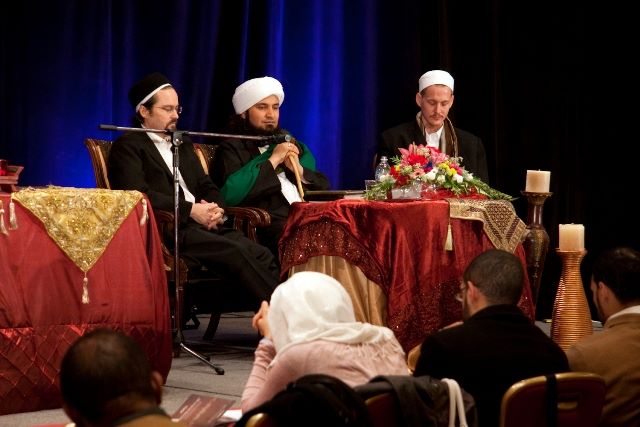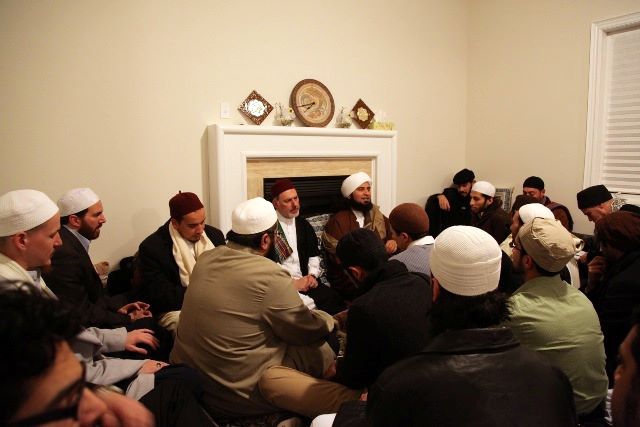Habib Ali al-Jifri – Lessons on Anger, Forbearance, and Disciplining the Soul Through Prophetic Wisdom – from the RIS Knowledge Retreat
Podcast: Play in new window | Download (26.4MB)
قبس النور المبين من إحياء علوم الدين – دروس وخطب – موقع الداعية الإسلامي الحبيب علي الجفري

Lessons by al-Habib Ali al-Jifri on explaining “The Ray of Clear Light of the Revival of the Religious Sciences” written by al-Habib Umar bin Hafiz, delivered at this year’s excellent Reviving the Islamic Spirit Knowledge Retreat.
Lesson One: The Blameworthiness of Anger
Download: Lesson One (right click to save)
* Renewing intention when attending gatherings of knowledge
* The rank of knowledge & scholars
* Terms and the science of purification of hearts
* The rank of the sciences of excellence and purification
* Answers to issues arising regarding Imam Ghazali and his Ihya’
* An overview of the “Book on the Blameworthiness of Anger, Malice, and Envy”
* The contemporary importance of this Book
* The harms of anger
Lesson Two: The Reality of Anger
Download: Lesson Two (right click to save)
* The wisdom behind the creation of desires
* The true understanding of freedom
* Freedom of expression, and anger when sacred symbols are violated
* The reality of anger in a human
* The principles of dealing with anger and the way of balance
Lesson Three: Can Anger Be Extinguished Through Spiritual Discipline?
Download: Lesson Three (right click to save)
* The outward and inward effects of excessive anger
* The harmful inward results of anger: malice, envy, thinking ill of others, etc
* Looking with insight at the tricks of the ego is a great means to Allah
* Spiritual discipline isn’t possible without anger
* The praiseworthy balance
* Anger and how it is directed: the case of the Danish cartoons
Lesson Four: The Virtues of Restraining One’s Anger
Download: Lesson Four (right click to save)
* Beginning with questions from the students
* The cure for the misgivings that lead to anger
* Allah has made us responsible for that which is closer to the Sacred One (al-Quddus) and not to lower selves (nufus)
* The vitues of restraining one’s anger for the sake of Allah
* A poem in praise of Imam Ali Zain al-Abidin and the meanings of forbearance it contains
* The contiguously transmitted (musalsal) hadith on love
Lesson Five: Forbearance (hilm)
Download: Lesson Five (right click to save)
* Why forbearance is superior to restraining anger
* Knowledge is through strudy and forbearance is through forcing oneself to be forbearant
* Forbearance is a sign of complete intelligent and the submission of one’s capacity for anger
* Correcting the understanding of strength for the sake of Allah Most High
* The meaning of malice (hiqd) and its harmful consequences
Lesson Six: Problems in Contemporary Muslim Life
Download: Lesson Six (right click to save)
* Lesson for Questions and Answers
* The reason behind the crimes of both terrorism and the fight against it
* Are we fulfilling our responsibilities as bearers of a Divine Message?
* The role of forbearance in our contemporary context
* The reason for the weakness in Islamic discourse: the weakness of the institutions of sound traditional Islamic learning
* Caution in whom one takes one’s religious understanding from
* The dangers of declaring other Muslims disbelievers (takfir) and of accusations of polytheism (shirk)
* Remembering priorities
From Habib Ali’s site.
In Arabic: قبس النور المبين من إحياء علوم الدين – دروس وخطب – موقع الداعية الإسلامي الحبيب علي الجفري
In English: http://www.alhabibali.com/en/news/
Lessons conducted at the RIS Knowledge Retreat: Knowledge Retreat 1430
The text in Arabic: The Condemnation of Rage, Rancor and Envy (pdf)

Habib Ali al-Jifri, with Shaykh Hamza Yusuf and Shaykh Yahya Rhodus

Habib Ali at Shaykh Talal Ahdab’s House, with a number of scholars and activists.
Pictures taken from Habib Ali al-Jifri’s web site. The first two pictures are (c) Reviving the Islamic Spirit, 2010, and taken by Umar Shahzad.

